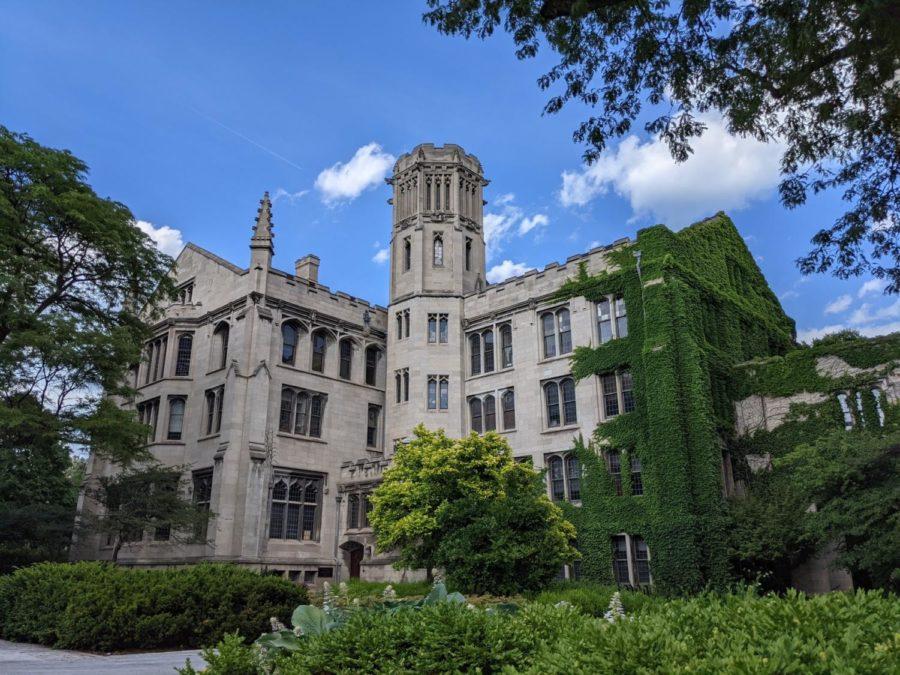The UChicago Podcast Network (UCPN) features over eight shows that span a diverse range of disciplines—from politics and economics to astrophysics and human rights—highlighting scholarly discourse at the University of Chicago. The Maroon spoke with Big Brains host and Vice President of Communications Paul Rand, Not Another Politics Podcast co-host and Sydney Stein Professor in American Politics William Howell, and UCPN Assistant Director Matthew Hodapp about their experiences hosting and producing podcasts for the network.
“A rising tide lifts all boats,” Hodapp said, “so, we thought, why don’t we just put everything under a singular banner, under a similar mission of trying to be competitive in the larger ecosystem.” Thus came to be UChicago’s very own Podcast Network, now the largest academic podcast network in the country, with nearly two million downloads over the last year.
Bringing over a decade of experience in podcast production, Hodapp has been with the University since 2019. He has been assistant director of the network since 2022. “There’s this thing in podcasting I call the pocket principle. When people are deciding to listen to a podcast, they’ll give it about 30 seconds before maybe clicking on something else,” he said. According to Hodapp, if you can convince your audience to put their phone in their pocket while doing the dishes or walking the dog, it’s unlikely they’ll take it back out. It is from this, he says, that arises a unique opportunity to put forward an exciting educational product.
When asked what makes UCPN unique, Rand promptly answered: rigor. “I think the students that thrive here are those that come for a true passion of learning, and it becomes a lifelong way of operating in the world. So, I think the podcasts are just part of fitting into that way of being in the world,” Rand said.
“We hold attention here that is born of two competing aspirations. One that has defined the University of Chicago, which is a commitment to understanding the value and integrity of evidence and ideas, in its own right,” Howell said. “There’s another ambition, especially here at the Harris School, which is to speak to people outside of our tribe and engage in something larger.”
According to recent studies by Forbes, podcasts have gained immense popularity across all audiences with its accessibility and diverse content offerings. Yet, their popularity coincides with a rising tide of misinformation across the media ecosystem.
“We are [named] ‘Not Another Politics Podcast’ because we aren’t just leaning back and slinging opinions about the latest headlines. We’re trying to model all that scholarship has to offer and what it means to productively and critically engage it. We don’t treat it as gospel; we don’t bow before it,” Howell said.
In this way, rigorous academia serves as a safe harbor among all the bluster, chaos and posturing that informs so much of political discourse today.
“I think one of the issues in media today is that we want to be as frictionless as possible. And, of course, reality, especially scientific reality, is not frictionless. If you don’t challenge and try to engage with some of the harder stuff, you’re maybe doing a disservice to your audience. We put a lot of effort into not falling into that trap,” Hodapp said.
Yet, beyond its endeavors to illuminate the latest findings in academia, the UCPN has also played a fundamental role in allowing the world to keep a firm finger on the pulse of the University’s own advancements. “It wasn’t that long ago that there used to be a belief at the University of Chicago that if people needed to know about us, they would find us,” Rand said.
Now, according to University Communications, there has been an observed trend of prospective students tuning into UCPN shows, providing Rand with a direct lens into how scholars are “defining their fields while confronting some of the world’s most pressing research questions.”
“The benefits of doing this then have multiple layers, and it’s some of the most popular content we put out because people get to really experience life at the University. It’s almost like listening into a college lecture,” said Rand.
In discussing some of the challenges and criticism facing institutions of higher education, Rand said that conversations have become increasingly politicized in a way that is unproductive. “When you think about the value and the impact of higher education, helping people not only to learn but hopefully how to open up their minds to new ideas, to doing research that is truly changing the world during a time when we are facing some of the biggest challenges as a society.” Rand said he finds that answers to many of our challenges can be found within universities like UChicago.
“There’s a much bigger calling at stake: it’s very easy to criticize something that you don’t know anything about. It’s a lot harder to hate on something that you have a deeper understanding of. That is a big thrust of what we’re trying to do with the UCPN,” Rand said.









